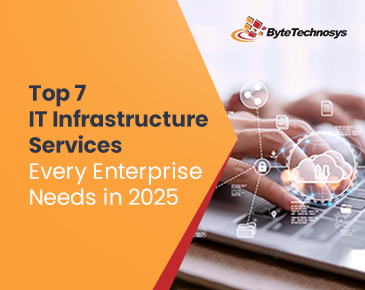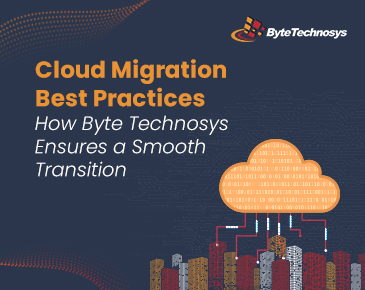
Every business leader has lived through that sinking moment—when the system crashes, the website won’t load, or a key application suddenly refuses to respond. In those few minutes (or hours), operations stall, employees scramble, and customers get frustrated. Now imagine that happening during peak season or while closing a critical deal. This is why IT infrastructure management services have shifted from being a “nice-to-have” to an absolute business necessity. Modern companies run on technology the way cities run on electricity. If the flow stops, everything else collapses.
But here’s the twist:
IT environments are no longer simple. They now consist of complex ecosystems that span cloud infrastructure, on-premises data centers, third-party applications, and remote users across multiple geographies. Managing this complexity demands deep expertise, proactive planning, and continuous, round-the-clock monitoring.
So, what services really matter in 2025?
Let’s cut through the noise and look at the seven IT infrastructure management services no enterprise can afford to ignore.
1. Network Operations Center (NOC) Services
Imagine an airport without air traffic control. Aircraft may still depart, but eventually, a breakdown would be inevitable. That is precisely why companies require a Network Operations Center.
A NOC staff constantly manages network operations monitoring, detecting unusual behavior, dips in performance, or system notifications. The key benefit is speed issues are solved before employees or customers even realize anything is amiss.
Consider the cost of downtime. For a mid-sized enterprise, even one hour of disruption can eat into revenue, productivity, and customer trust. Reliable NOC monitoring ensures those costs are avoided, keeping both IT systems and business operations running like clockwork.
2. Cybersecurity & Threat Defense
Let’s be blunt: cybercriminals don’t care whether you’re a startup or a Fortune 500 company. If there’s a vulnerability, they’ll exploit it.
In 2025, firewalls and antivirus alone are old barriers. Companies require layered security solutions that incorporate intrusion detection, real-time threat hunting, endpoint protection, and compliance auditing. The level of sophistication of attacks be it ransomware, phishing attacks, or AI-based breaches requires similarly sophisticated protection. And protecting data isn’t even the main objective. It’s about defending trust. A single security breach can take years to recover from not financially, but in terms of reputation.
3. Cloud Infrastructure Management
The cloud started out as the promised land of convenience. Spin up a server in minutes, scale at will, and pay for only what you use. Sounds simple, right?
In reality, most organizations discover that cloud costs spiral quickly, workloads sprawl across multiple providers, and compliance is a constant headache. Without proper cloud infrastructure management, businesses often end up with complexity instead of clarity.
This is where partnering with a managed cloud services provider makes sense. Experts streamline resources, optimize spend, and secure data while giving IT leaders back their time. The result? Companies get the agility and cost savings the cloud was supposed to deliver.
4. Data Center Operations
Despite all the hype around the cloud, let’s not write off data centers just yet. Industries like healthcare, finance, and telecom still depend heavily on performance, compliance, and sometimes even customer trust.
But running a data center is like running a 24/7 machine. Cooling systems, servers, patch management, backups, and physical security all need constant oversight. A single oversight could ripple into hours of downtime.
That’s why well-run data center operations remain mission critical. For organizations that can’t afford a pause in services, a robust data center strategy is non-negotiable.
5. Backup & Disaster Recovery (BDR)
Here’s a scenario: a ransomware attack locks down your systems overnight. Or a natural disaster damages your local servers. What happens next?
If your business doesn’t have backup and disaster recovery solutions, chances are you’re offline for days, maybe weeks. That kind of downtime is more than just inconvenient, it’s potentially fatal for a business.
Modern BDR strategies focus not just on data storage but on business continuity. With cloud-based server solutions, recovery is now faster, more efficient, and far less expensive. Instead of losing weeks, organizations can be back up and running in hours, sometimes minutes.
6. End-User IT Support
Here’s a little secret: the IT issues employees complain about most often aren’t the big ones. They’re the small but constant interruptions—slow laptops, failed logins, or video calls that just won’t connect. These may seem minor, but they quietly eat away at productivity.
End-user computing support fixes this. It ensures devices are maintained, software stays updated, and helpdesk support is ready when employees hit a roadblock. In today’s hybrid workplaces, where remote teams rely on multiple devices and networks, reliable support keeps people productive and engaged.
7. End-User IT Support
Think about it, your business pretty much lives inside a few systems. Your CRM keeps track of sales, your ERP handles the money stuff, and your databases give you the info you need to make decisions. If any of those slow down or crash, it’s not just annoying it can mess up everything.
That’s why keeping applications and databases in check is so important. It’s not just “make it run,” it’s making sure it runs well, stays secure, and doesn’t surprise you with problems. When you manage it right, your tech actually helps you grow instead of slowing you down.
Why it’s smarter to do it together
Each IT service matters on its own. Cybersecurity is important, backups are important, monitoring is important. But on their own, they’re not enough. You can have top-notch security, but if there’s no backup plan, one mistake can cost you big. A cloud setup is great, but if no one’s watching it, things can go sideways fast.
When you put it all together NOC monitoring, cloud management, backups, disaster recovery, database management you get something that just works. IT isn’t constantly running around fixing problems. Instead, it supports the business and helps things run smoothly.
Conclusion
IT isn’t just a back-office thing anymore. It’s the foundation that keeps your business going. Ignore it, and you’re basically driving without insurance, maybe it’s fine for a while, but the moment something goes wrong, it hits hard.
Companies that manage IT properly from monitoring networks to keeping cloud servers running have fewer problems, stronger security, and smoother performance. The ones that don’t? They fall behind businesses that treat IT as a real advantage, not just something to check off a list.
At ByteTechnosys, we help businesses simplify IT complexity and protect what matters most. With the right infrastructure in place, companies don’t just survive they scale with confidence.
Ready to future-proof your IT? Contact Us today and let our experts help you build a secure, scalable, and resilient IT foundation



